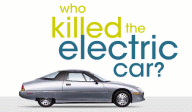 The movie
Who Killed the Electric Car? was released recently. I have
not seen it, but from the reviews and the trailer and all, it's pretty
clear that the film is a documentary of how General Motors ended the
EV-1 electric car project.
The movie
Who Killed the Electric Car? was released recently. I have
not seen it, but from the reviews and the trailer and all, it's pretty
clear that the film is a documentary of how General Motors ended the
EV-1 electric car project.
I took an EV-1 for a quick test drive around town some years ago, and indeed, it's a fine little car. It's remarkably zippy and quiet. There's no transmission. And starting it up is very cool, the dashboard lights come up with computer noises like the freakin' Starship Enterprise (but, of course!). It's too small to be practical for someone like me; I doubt I could fit any musical instruments in it, and that's the main feature I look for in a vehicle. But my personal needs aren't necessarily typical.
Regardless of the movie viewing experience, I'll claim that dwelling on GM's screwups is simply not productive. Let's be honest, we have never expected GM to do anything innovative in car design. When I think of GM I think of the Corvair, or the General Lee on the Dukes of Hazard. Who cares that GM killed their electric car project for whatever crazy reasons?
(On the other hand, I am disappointed that Volkswagen has not addressed the electric car yet. Especially considering that VW models have always been popular for electric car conversion projects. I expect innovation from VW, but that's a different story.)
 What I do think is important is that a Silicon Valley company called
Tesla Motors
is taking the bull by the horns and actually going into production
with a very cool electric sports car. And while this particular
model is too small to fit any musical instruments, it might very well
be successful.
What I do think is important is that a Silicon Valley company called
Tesla Motors
is taking the bull by the horns and actually going into production
with a very cool electric sports car. And while this particular
model is too small to fit any musical instruments, it might very well
be successful.
(The car is also pretty expensive, sure, but their business plan involves starting at the high end and working down the price range with manufacturing experience.)
Interestingly enough, the premiere of the movie (June 28, 2006) and the introduction of the Tesla Motors car (July 20, 2006) are both within two weeks of Nikola Tesla's 150th birthday (July 9, 2006). (!!!)
 And there's more... Another Silicon Valley company called
Wrightspeed
is also working on a high performance electric sports car.
And there's more... Another Silicon Valley company called
Wrightspeed
is also working on a high performance electric sports car.
So, let us review... General Motors created a respectable electric car and, for whatever mysterious reasons, decided to abandon the project, and some guy went to the trouble of making a film about it, and two Silicon Valley companies are actually making significant progress at serious electric vehicles. There ya go.
But there's an important socio-political concept here... I've noticed that there exists this human tendancy to take some difficult problem or task and hand it off, trusting it to some organization that clearly is not competent enough to deal with the problem, perhaps in the process even fostering a dependency on this organization, declaring the problem solved, and then later getting all pissy when things haven't worked out. We need a word for this behavior. It's closely related to that classic definition of madness, "performing some act over and over again, expecting a different result". Maybe "delusional" is the word.
So yeah, expecting GM to develop an innovative electric car and then whining about it when they don't is an example of this. Another example would be like demanding that the federal government be responsible for providing your health care and then complaining when the very entity that you don't trust to deliver the mail screws things up badly. Or expecting anything positive from the United Nations.
The Silicon Valley approach is not like that. Instead we get out there, roll up our sleeves, apply some innovative and do what needs to be done. It's optimism, it's positive, it's progress, and it's where the truly rewarding opportunities lie.

Post a comment
Thanks for signing in, . Now you can comment. (sign out)
(If you haven't left a comment here before, you may need to be approved by the site owner before your comment will appear. Until then, it won't appear on the entry. Thanks for waiting.)